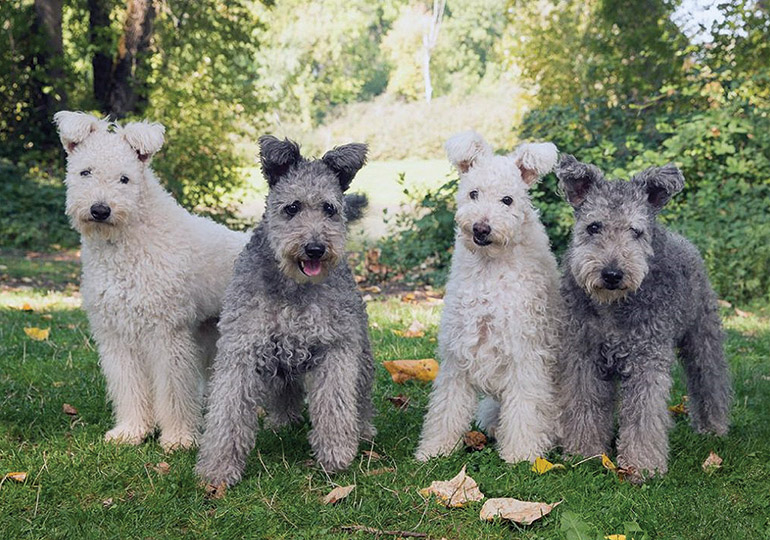
GROUP 5 - WORKING DOGS
The Pumi originated in the 17th or 18th century, when shepherding Terriers were brought to Hungary from Germany and France. These dogs mixed with the Puli and the result was a Terrier-type herding dog with a medium long coat (easier to groom than the Puli), elongated muzzle, prick ears, high set tail broadly curving over the croup and a Terrier nature and habit. The Pumi in comparison to the Puli is much younger in its origins and was first regarded as an individual breed around 1920.
The Pumi is a vigorous and sturdy sheepdog and its Terrier nature makes the breed a successful ratter and hunting dog. The Pumi is affectionate with its master and has a cheerful disposition. It can be shy around strangers, a characteristic which makes it a good watchdog. The Pumi is essentially an outdoor dog and will be at its best living on acreage or a farm.
The Pumi is a middle-sized, Terrier-like dog, with a long, thick, curly coat, which does not form into cords like the Puli. The tail has a distinctive curl and is carried high; this is complemented by a similar tendency in the ears. Coat colours are black, all shades of grey and reddish brown, but always one solid colour.
The Pumi is a healthy breed and reputable breeders will ensure breeding stock have current eye certificates and undergo screening for hereditary diseases, such as Hip Dysplasia. For both the Puli and Pumi, advances in DNA testing will enable breeders to be better informed about the genetic health of their breeding stock.
The Pumi needs a lot of exercise and space and, being very vocal, may disturb neighbours if living in an urban environment. The Pumi was first developed for driving cattle and as a watchdog. In recent times it has become popular as a companion dog and needs to be kept busy with sporting activities such as Agility classes.
The Pumi’s coat is easy to groom; occasional combing and brushing will keep it looking good and will need occasional trimming. The web type feet of the Pumi are susceptible to burrs or grass seeds and should be checked frequently. Showing a Pumi requires special grooming which is achieved by hand stripping the coat; smaller corrections around the head and legs can be achieved by scissoring, however, preparing the entire coat with just a pair of scissors is not desirable.
Words: Royson Valore
Image: Terry Jacobson Photography
Now you know a little about the Pumi you may have think that this is the dog for you. Before you make a decision, please make contact with the breed club or your State controlling body for purebred dogs. They will be able to give you information about available puppies and also suggest dog shows where you can see the breed and speak to breeders. In this way you will gain a better perspective of the Pumi and its needs and whether this breed would suit your lifestyle.